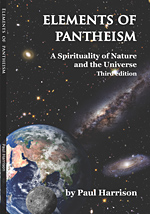Pantheism means truly living each day one at a time,
because now is all there is
I realize how right it all is and how I’m part of it.
I know that when I die I am still part of it just in a different way
Sharon Dobrovic |
 |
To me, and I truly do speak only for myself here, pantheism means rethinking my belief system of forty-plus years, letting go of old ideas that promised false hope and false security in a world that doesn’t exist. It means letting go of words that had become commonplace to me and learning new ones, letting go of “God” and that “God is all good.”
Pantheism means truly living each day one at a time, because now is all there is, and being more aware of the decisions and choices I make through the day, because I realize that my choices can affect other people, animals, the planet, the universe. There is no savior to wash away “sins” or make it right in another life.
Thus, it means living a more thoughtful life. I won’t always make the best decisions or the “right” ones but I will think more about them, and some of them will become my new commonplace. It means respecting other people’s rights to be here even if I think they are making a mess of their lives. It means letting them make their own choices, some of which are unpopular or destructive, and speaking up when I feel it’s appropriate. It means standing up for human rights and hating certain behaviors even while I try to put myself in the place of other people and understand better why they act as they do.
Being a pantheist doesn’t mean I love nature more. I loved nature before. I was always most at home and most deeply moved sitting by a river, canoeing on a quiet lake, hiking in the woods, or sitting on the porch looking at the mountains. Looking up at a winter sky full of stars filled me with awe then and still does.
I appreciate it more now. I realize how right it all is and how I’m part of it, as is every part of creation. It means knowing that when I die I am still part of it just in a different way. It means living my life with integrity and in a way that will be remembered for positive contributions to my community or whatever part of the planet I come in contact with rather than for destruction.
It means letting go of the importance of my individual personality in the big scheme of things and realizing I live on through my children (and possibly my children’s children) genetically, through the things I have taught them and how they act in the world, through my own actions and effects on people I meet, and through memories others have of my life. As far as social issues, I have my chosen ones to take up a cause for (gay rights and gay marriage, separation of church and state, antiracism, animal rights). I don’t personally think there should be global WPM shoulds and oughts as far as particular causes to follow. I think people will take up causes that touch them in some particular way. Those social issues were important to me before pantheism and still are just as important to me.
Finally, pantheism means being me, living my life authentically and not letting other people determine how I think or feel or act. It means expressing the source or nature or creation as the unique me, here and now.
Eljay Love-Jensen |
 |
Being a Pan means that I am conscientiously aware of the beauty and majesty around me, and within me. That I am, indeed, part of everything-that-exists. I am a minuscule, perhaps infinitesimal part of everything. But I am part of everything intrinsically and integrally.
Being a Pan means that I hesitate before becoming angry, and try to look at the bigger picture. Being a Pan means that I have no invisible means of support. Being a Pan means that I do not indulge myself with comforting fantasy — such as clinging to the belief of an afterlife as a response to my survival instincts. As such, I value the ephemeral life I have more so, and I value the lives of those around, both human and non-human.
Being a Pan means that I realize that — in the greater scheme of things — I am no more important than a robin, an elephant, a firefly, or a bacterium. I am important to me, to my family, to my friends, to my co-workers, and to many others whose lives I’ve touched. I try to make my life a “valueadd” for my family, my community, my society and humanity.
Being a Pan means that I an sceptical of extraordinary claims. I take a cautious view of claims that appear to be supernatural, pseudo-science, rumour, hearsay, imaginary, or misattributed. I am less gullible and less credulous. Being a Pan means that I readily engage in conversation about Pantheism; but I do not coerce, cajole, or pressure to convert anyone else to Pantheism. I think the merits of Pantheism stand on their own, and do not need pontificating to propagate.
Being a Pan means that I do not believe that the universe has a purpose or meaning. I am free to figure out my own purpose and meaning in life. Being a Pan means that the universe neither loves me, nor hates me; it is not testing me, nor out to get me. The cosmos is without volition, will, intent, sentience or sapience. No “big brother” anthropomorphic / personified supreme being watching over my shoulder.
Being a Pan has brought me peace, tranquility, serenity, equilibrium and equanimity. That reflects in my life and behavior. Being a Pan in the WPM community has brought me like-minded individuals with which to share our beliefs; and the community acts as a sounding board by which I can bounce my ideas (good or bad) — weed out the harebrained and keep the commendable.
Being a Pan means that my “worship” consists of getting up, getting ready, meeting the challenges of the day, and then getting a good night sleep. I’m in “church” every minute of every day of every year.
Can I tell my children that to be a pantheist means to revere all other religions? I’m not telling my children that. I don’t see how that is entailed by Pantheism. There are some other religions that I find have merit, but I find that a majority of them encourage damaged critical thinking, wishful thinking, magical thinking.
What do I say to them about the beliefs for which they are willing to die? I’m going to say, “It’s better to have a belief that you are willing to live for.”

